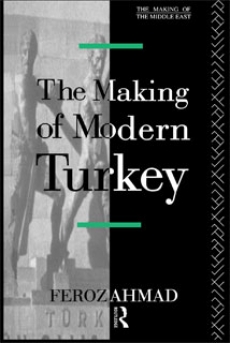| Éditeur : Routledge | Date & Lieu : 1993, London |
| Préface : | Pages : 267 |
| Traduction : | ISBN : 0-203-72628-6 |
| Langue : Anglais | Format : 140x215 mm |
| Thème : Politique |
|
Présentation
|
Table des Matières | Introduction | Identité | ||
 The making of modern Turkey Written at a time when the Turkish military has been playing a prominent political role, The Making of Modern Turkey challenges the conventional wisdom of a monolithic and unchanging army. After a chapter on the Ottoman legacy, the book covers the period since the revolution of 1908, examining the processes by which the new Turkey was formed. Successive chapters then chart progress through the single-party regime set up by Atatürk, the multi-party period (1945–60) and the three military interventions of 1960, 1971 and 1980. In conclusion, the author examines the choices facing Turkey’s leaders today. In contrast to most recent writing, throughout his analysis, the author emphasises socio-economic changes rather than continuities as the motor of Turkish politics. | |||||
| Preface and acknowledgements After years of research on the history of the late Ottoman Empire and modern Turkey, I had an urge to write an essay explaining the country to the general reader. This essay would synthesise my own research as well as the work of Turkish writers who had written extensively since the political liberalisation which followed the military intervention of May 1960. Roger Owen gave me the opportunity to do so when he asked me to write a book on Turkey for his series The Making of the Middle East. The theme of the series suited me well because I too wanted to emphasise the active process suggested by the word ‘making’, the process adopted by the Ottoman-Turkish political elite at the beginning of the twentieth century. I also wanted to avoid the element of voluntarism suggested by the use of terms such as ‘the rise’, ‘the development’, or ‘the evolution’ of modern Turkey. Turkey, as is often suggested, did not rise phoenix-like out of the ashes of the Ottoman Empire. It was ‘made’ in the image of the Kemalist elite which won the national struggle against foreign invaders and the old regime. Thereafter, the image of the country kept changing as the political elite grew and matured, and as it responded to challenges both at home and abroad. This process of ‘making’ goes on even today. Something needs to be said about the organisation of this book. Since it was conceived in the early 1980s when Turkey was under military rule, I thought it necessary to explore the roles of the army as a dynamic institution which responds to social change, and abandon the notion of a static body which stands outside or above society mediating conflict like a neutral referee. This I do in the introduction. The rest of the book is organised chronologically beginning with a chapter on the Ottoman Legacy and concluding with an Epilogue which examines Turkey’s options in the 1990s. This book has been written primarily for general, non-expert readers of English who want to have a better understanding of a fascinating and vital country in the region. I have therefore provided references and bibliography only in the English language to guide those who may want to delve a little deeper into the subject. In the text there are many quotations for which no reference is cited. These quotations are from Turkish sources. I felt that Turkish citations would be an unnecessary distraction for readers of English and therefore omitted them. In writing this essay I have incurred many debts especially to friends in Turkey who have shared their ideas and taught me about their country ever since my first visit in 1962. The late Tarik Zafer Tunaya was one of the most generous of these friends. Roger Owen provided encouragement throughout the entire project, read the manuscript in various drafts and made wise suggestions which improved the quality of my work and saved me from errors. Mehmet Ali Dikerdem read the final draft and shared with me his vast knowledge and keen understanding of contemporary Turkey. Finally, my appointment as a University Research Professor provided some more time for writing and research and facilitated the completion of this enterprise. Feroz Ahmad | ||||